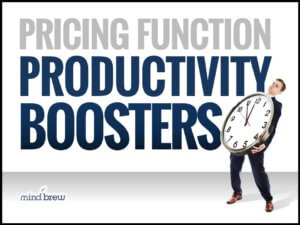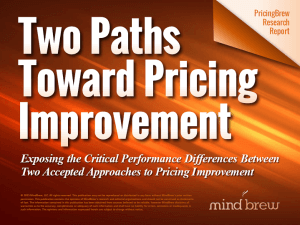If you’ve ever done any gardening at all, you know how quickly weeds can crop up. Even if you take some preventative measures like herbicide or putting down wood chips or rocks or landscape fabric around your flowers or vegetables, it’s nearly impossible to avoid getting some unwanted plants.
You really need to go through your beds at least once a week to pull out any new weeds if you want to have a productive garden. And the best gardeners try to pull a few weeks every day. Without this sort of careful, regular attention, the weeds start to take over and crowd out the things that you intended to grow.
Something very similar happens on pricing teams. You want as much of your time as possible to be spent on productive work. But over time, less-important tasks — the “weeds” — crop up. And if you don’t eliminate them, those weeds will multiply and crowd out the things that you intended to do.
So how do you avoid this problem?
In our Productivity Boosters webinar, we recommend
“On a regular basis, look for the busywork and nice-to-haves that you can eliminate.”
So what counts as busywork?
Unless your team is far more diligent than most, you almost certainly have regularly weekly meetings or check-ins that have outlived their usefulness. It often happens that meetings that begin with a well-established purpose and defined agenda lose their focus over time. Eventually, you might be meeting just for the sake of meeting. Get rid of as much of that as you can.
Or maybe you spend time compiling a report that isn’t very valuable or duplicates information that is available elsewhere. Maybe your team spends time on a pet project for an executive that isn’t very strategic. Maybe you have agreed to help out on some ad hoc committees or focus groups that are no longer accomplishing much. Maybe you agreed to do some work because you wanted to get along with co-workers on another team, but it really isn’t as effective as something else you could be doing.
The exact nature of the “weeds” will vary depending on your unique situation, but we are 99% sure that you have some tasks that you could scrape off your plate.
The benefit of doing so is that is frees up your time — and just as importantly, your mental capacity — for more productive tasks. Nearly every time management guru or business coach will tell you that this is an essential part of reaching your maximum potential.
So what does that look like in practice?
As an individual, set aside a few minutes each week — maybe at the beginning or end of the week — to evaluate the tasks you have and decide whether any can be eliminated. As a group, do the same thing at least once a quarter or maybe even once a month.
In between, zealously guard your workload. Before you say yes to a project, consider whether it will add real value to the organization and isn’t displacing some more important work.
We cover six other productivity boosters in the full webinar. It also includes some other tips and tactics for helping your pricing team become as effective and efficient as possible.
If you weed your garden, you have a much better chance of harvesting a productive crop. The same is true when you “weed” the unnecessary tasks from your to-do list. And whether we are talking about your garden or your work projects, you will find it much easier to control the weeds if you stay on top of them regularly instead of trying to get rid of a whole bunch at once after they have had time to grow and multiply.













